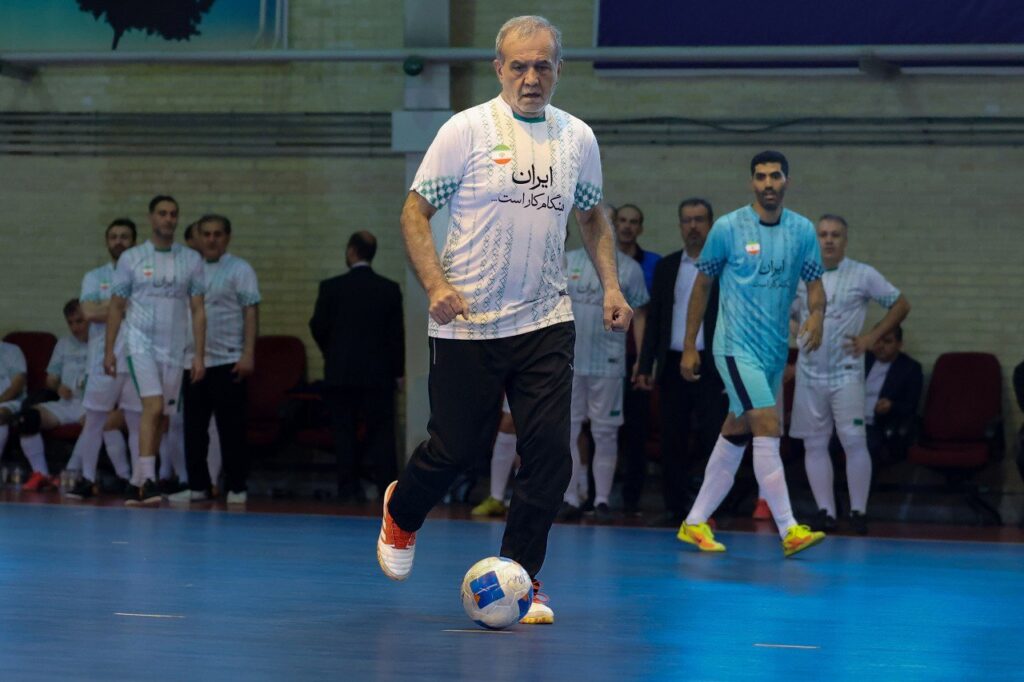TEHRAN – Last Monday, Iranian President Masuud Pezeshkian and his delegation set out on an official trip to the Republic of Azerbaijan. This trip was scheduled for two days. The first day and the second day in Baku will be the second at Ganja, the resting place for famous Persian poet Hakim Nezami Ganjavi. However, the tragic fire incident in Bandar Abbas forced us to shorten our trip.
The plane took off from Tehran’s Merabad airport just before the noon prayer, crossed the Caspian Sea before heading for Baku. From the start of the flight, I spoke with a media representative in the President’s Office and requested a brief, informal interview with Mr. Pezeschkian. They agreed and said they would raise it with him. The flight was so short that we had little time to realize we had landed at Baku Airport, greeted by cloudy skies and strong cold winds.
The trip was intense and full of activity. In fact, I didn’t even have the opportunity to have lunch. Pezeshkian’s final engagement was a meeting between an Iranian and a student living in Baku. As soon as the program was finished, we rushed to the airport and I pursued the possibility of conducting an interview again. A light dinner was served during the flight, and the flight map showed it was only 20 minutes away from Tehran.
Mr. Pezeschkian walked down the aisle of the plane, greeted his companions and thanked them for their efforts. When he contacted me, I showed him a photo of the upcoming edition of The Tehran Times on my phone. It features an image of him shaking hands with Ilham Aliyev, and with headlines it is “The Path of Friendship.”
I told Mr. Pezeschkian that the presidents of several countries often hold informal interviews with journalists during flights. I want to ask him a few questions in the same spirit. He replied, “We will land soon, but we will get closer so that we can see what will happen.” A few minutes later I found myself sitting next to the president in front of the plane and ready to ask my questions. Shortly after the interview was over, we landed in Tehran.
Below is the text from an interview with Iranian president Masoud Pezeshkian.
President, what time do you usually start your day?
Usually around 7am.
And when do you finish work?
That’s different. My schedule is really not typical. Sometimes I’m home by 7pm. Sometimes it’s not six, sometimes even eleven. It really depends on what we are working on. For example, what time do you get back tonight?
I think it’s close to 11 now.
It’s already past 11. We don’t even go home in the middle of the night.
I’ll make it tomorrow!
It just depends on your work and the schedule for the day. The timing is unpredictable. However, I consider myself available 24/7.
President, I understand that you were quite involved in sports and mountain climbing before the presidency. Do you still have time for leisure or sports activities?
Very few. I’m going to hike once a week if possible. But even going on a hike is not easy. They need to choose a place where we can maintain privacy and security. In short, they limit my general contact and say it’s impossible to do that in any other way. There’s nothing I can do about it.
How did Peshshkian change before and after becoming president?
What does it mean? I’m still myself. It hasn’t changed much. I’m the same person
Well, the responsibility and weight of that…
ah! The burden of responsibility is, of course, much heavier. We often say we were free and unburdened before. Now we are tied up and in a way we are incarcerated. However, this “incarceration” pursues solving people’s problems. It’s worth it because we’re trying to ease their difficulties. What we maintain hope is that to maintain our efforts and maintain the endurance of these difficulties, we can solve our people’s problems and bring joy to the hearts and spirits of our children and all. The more you can do that, the easier and more endurable the pass.
I would like to hear a little about your personal relationship with the leaders of the Islamic Revolution. What do you think?
We’re always close. We have always sought to stick strictly to designated positions, following the policies and directions he outlined, without departing from his intentions or guidance.
Some Western media claim that Iran negotiated with the US because of its weakness.
Have you heard in any of our arguments we have to negotiate or face serious issues?
no.
Some people have said in the past that if we don’t reach an agreement, we will face problems. We have never linked the future of our country, ourselves or our region into negotiations. We do our job. Of course, it is very beneficial to negotiate, build peace and improve relationships. However, this does not mean that a deadlock in negotiations will also reach a deadlock. We don’t. We need to unite to take advantage of intellectuals and wise people. Creating unity and unity means there are no obstacles that cannot be overcome.

